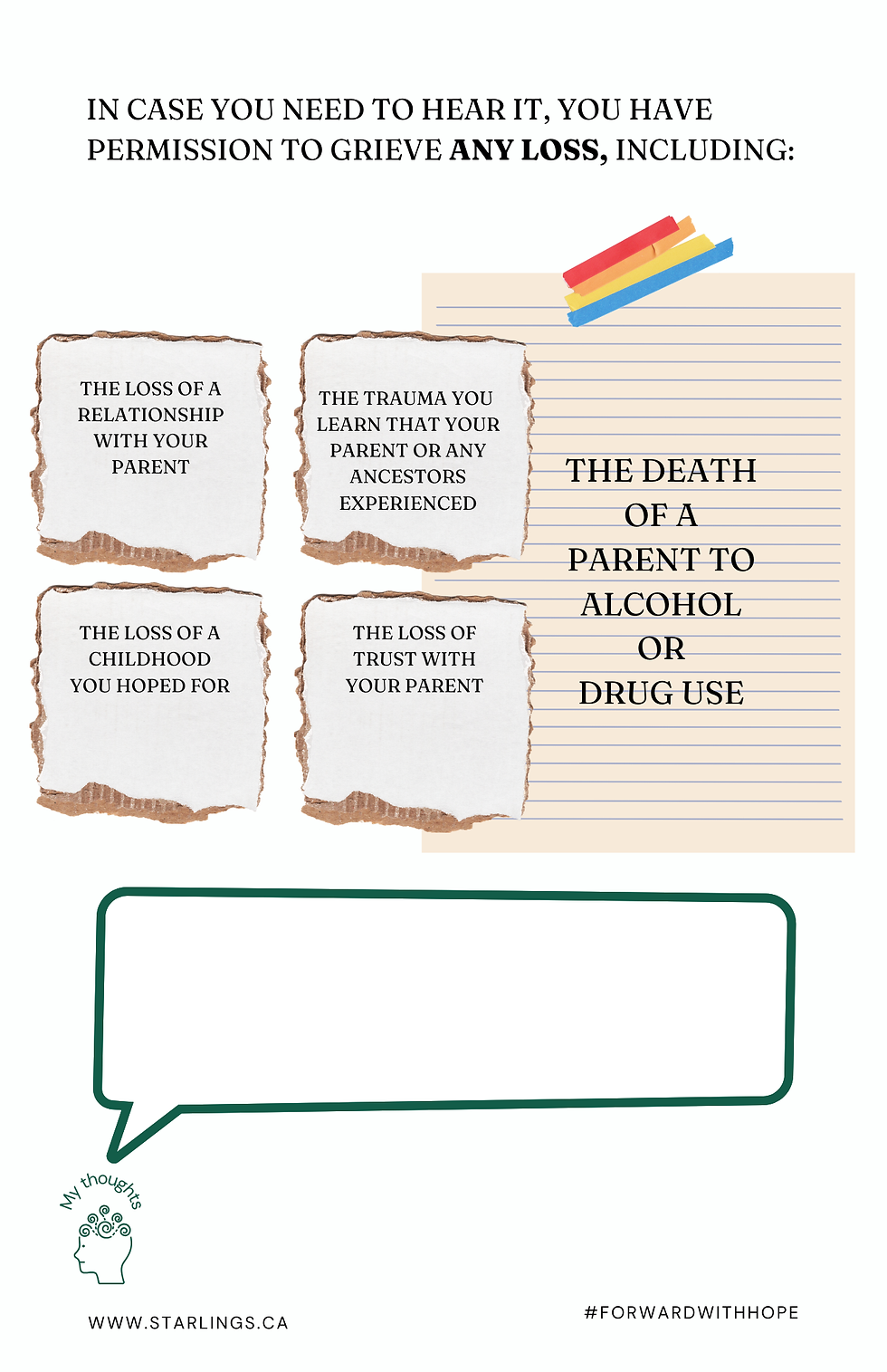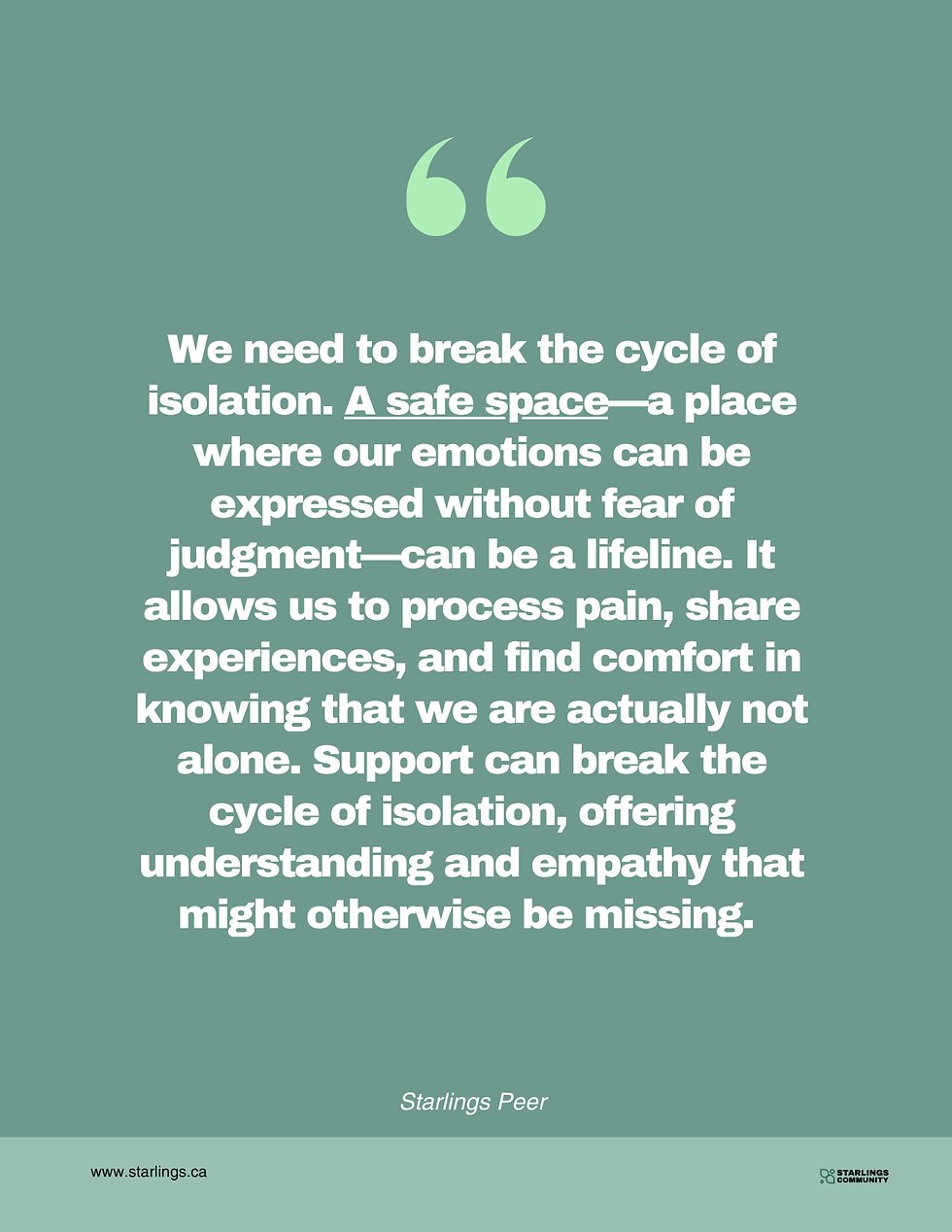It's Complicated: The Grief and Stigma Attached to Losing a Parent to Substance Use IOAD2025
- Aug 6, 2025
- 4 min read
"Grief is not just about loss, it’s about the longing for what could have been. Healing requires a space where we can grieve what has been taken from us, and in doing so, transform the pain into power." Shawn Ginwright (The Four R’s of Healing)

Loss in its many forms touches every one of us. It is an inevitable part of the human experience, and grief is how we adapt to that loss. However, grief is deeply personal-no two people grieve in the same way. There is no right or wrong way to process the pain of losing someone, but it is essential to acknowledge and express those feelings in healthy ways. This can be difficult, especially when the grief is complicated and attached to losing a parent to substance use, which can bring with it challenging family dynamics and an incredible stigma. If left unaddressed, grief can take a heavy toll on our emotional and mental well-being, potentially leading to anxiety, depression, or a sense of isolation.
My journey with grief centres around the loss of my father. The grief I carry is complicated, shaped by a relationship that was anything but typical. By the time I was born, my father was already in the grip of alcohol addiction-a struggle that tore our family apart. He would come and go, disappearing for months, then reappearing with gifts or money, hoping they could fill the void left by his absence. But, as any child knows, gifts cannot replace lost time.
When he passed away, I was surprised by the depth of my sorrow. I thought I would feel indifferent. For years, I had imagined scenarios where his death would relieve the tension and anxiety his presence often brought. But grief doesn’t work that way. His death broke me, even though his presence had so often been a reminder of pain, anxiety, and disappointment.
A memory that haunts me to this day is a conversation I had with a friend, where I joked about my father’s death. Days later, I learned that he had passed away. For a long time, I blamed myself, as though my words had somehow caused his death. It has been ten years now, but the sadness, anger, and grief remain. Not being allowed to attend his funeral denied me the closure I so desperately needed. While my older siblings attended, my mother and brother decided my presence wasn’t necessary. That decision, their choice to withhold such a significant moment from me, is something that still brings tears to my eyes. No matter how strained our relationship was, I deserved the chance to say goodbye. He is buried in my home country of Pakistan, and though I have never visited his grave, I hope to one day-seeking a bittersweet moment of closure and peace that I have longed for.
Although grief is a universal experience, it can leave us feeling profoundly disconnected-from our loved ones, from ourselves, and from the life we once knew. Yet, finding connection through loss can be a healing force, even if it doesn't take away the pain. For me, a simple phone call, a heartfelt message, a hug, a shared prayer, or even revisiting a cherished memory can offer comfort and remind me that I am not alone.
For anyone supporting a young person who is grieving the loss of a parent to drugs, you might feel at a loss for words or unsure of how to offer support. But not saying anything can add to the grief. And when we are the ones grieving, we may not even know what kind of help we need, especially if we do not see our stories reflected in the support that is available.

But youth need to know that they are not alone - this itself can be a powerful source of comfort and strength. By opening up about my own experiences, I hope to create a space where others may see themselves, feel understood, and know that healing - even in its slowest, most uncertain form is possible.
Grief is messy and complicated. It does not follow a linear oath or come with a guidebook, this is still true for me today.
But we can find strength together, one step, one word, and one connection at a time. Together, our stories can be a bridge toward hope and resilience.
This can be heavy, so please feel free to take a break if you feel you need it. Grab a glass of water, or take a moment of pause here www.starlings.ca/take-a-pause
Access our free resource library here: https://www.starlings.ca/why-parental-addiction

August 31 is International Overdose Awareness Day, and this month we have a campaign to share the stories of grief and connection to support young people who have lost a parent to substances use to know they are not alone . Want to add your story to a zine that will go out in our hope kits this month?
As someone with lived experience with the loss of a parent.
Share your words or art here to support the healing of other young people grieving a parent.
Order a hope kit: Are you an adult family caregiver, like a grandparent, aunt, uncle or other parent to a young person who is grieving the loss of a parent to substance use related harms? You can access our Caregiver toolkit which goes out into our hope kits this month.
Order a hope kit here: https://www.starlings.ca/starlings-hope-kits
If you need support, please reach out to your community crisis support line or other organization or support service you trust: https://www.starlings.ca/community-crisis-lines




Comments